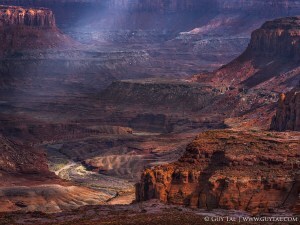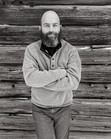The Attitude of Reverence
Announcements:
On Tuesday, July 23rd at 5pm Pacific Time, I will be interviewing my friend Colleen Miniuk about her recently released book, So Said the River (in which I happen to be a character). Registration is free and Colleen will be taking audience questions, too. I hope you can join us via Zoom.My upcoming book, Be Extraordinary, is now available for preorder and is expected to begin shipping in October. US buyers may preorder an autographed copy directly from my website. You may also preorder the book on Amazon. Shortly after the book starts shipping, Colleen and I will switch roles and she will interview me about the book in another Zoom event. I’ll announce more details as I have them.
Modern life seems to recede further and further away from nature, and closely connected with this fact we seem to be losing the feeling of reverence towards nature.
—D.T. Suzuki
[Note: if you purchase any items from Amazon using the links in this article, I will receive a small commission.]
I recently heard an interview with a photographer who lamented the discomfort and trials he endured while working outdoors on a project of nature photographs. He then said that the finished product—a beautiful self-published book—made it all worthwhile. Put another way, rather than savoring his time in nature, this photographer considered his time outdoor as hard work to be endured to produce something that is decidedly removed from his true experience in nature.
After many years of working with photographers, watching them in the field and listening to their stories, I was regrettably not surprised by this admission. In fact, I felt sorry for the photographer; not for the trials he endured, but for having missed out on what to me is the most rewarding aspect of being in nature and of producing creative work (in any setting).
My own attitude has always been the opposite: I go to nature because I love nature. I photograph because I love the intellectual and emotional challenge of expressing myself creatively. In my photographs, I hope to express some of these loves—my reverence for the beauty, complexity, and the emotions I experience when being in—not just photographing—nature, and my satisfaction in challenging myself to produce unique and personally expressive images. To me, a photograph—no matter how good or popular—cannot make a meaningless or unpleasant experience feel worthwhile. In fact, to me the opposite is true: an experience in nature is always worthwhile, even if I end up with no product to show for it.
Alfred Stieglitz described the idea of striving for an equivalence between the inner, emotional experience of a photographer while working and that of viewers who later see the resulting images. When striving to make equivalent photographs, the photographer’s goal should be, in Stieglitz’s words, “to hold the moment, to record something so completely that those who see it will relive an experience of what had been expressed.”
The idea of equivalence had a profound influence on later photographers who considered Stieglitz a mentor: photographers like Ansel Adams and Minor White. Adams explained the idea of equivalence as he learned it from Stieglitz:
I’m a total believer in the concept of the equivalent — a concept promoted by Stieglitz. I can paraphrase what he told me, not too inaccurately; he said, “I perceive the world around me as an experience of emotional and spiritual substance. I record this with my camera. I present the photograph as an equivalent of my response to this world which I wish to share with the spectator.”
There is an important and often unmentioned caveat to the idea of equivalence, which is this: as viewers, we have no way of knowing whether our experience when seeing an expressive photograph is truly equivalent with that of the photographer. Only the photographer knows. In fact, given that aesthetic impressions arise from a combination of objective and subjective factors, it is likely that equivalence is not truly possible, or at best a matter of degree. This is easy to illustrate when visiting popular scenic viewpoints. Surveying the people photographing, and you will notice some who work alone, quietly, slowly, immersed in their experience, looking deeply into the scene, alternating between the camera and soaking in the view and other sensations, detached from the commotion around them. Others—a majority—are often engaged in chatter, taking selfies, making “influencer videos,” and rarely stick around beyond the time they need to make a photograph. All these photographers may produce similar, beautiful, inspiring images—images that to a viewer may possess great aesthetic and emotional appeal—but not all of them experience the place in the same way.
Equivalence is thus not a quality of photographs alone; it is a quality of experience to be pursued by photographers for its own sake, to elevate their own life, regardless of whether others later have equivalent experiences. To viewers, on the other hand, equivalence is a meaningless concept. A viewer’s priority is not to speculate on what the photographer felt, but to maximize the quality of their own viewing experience, whether equivalent with the photographer’s or not.
“Before all else,” wrote Mihaly Csikszentmihalyi, “achieving control over experience requires a drastic change in attitude about what is important and what is not.” It is a common mistake when seeing a beautiful photograph to assume that going to the same place or copying the same composition will reward you with the same experience you may believe the original photographer had. Your own experience in the same place may be completely different, and it depends entirely on your attitude: whether you just go there to capture a photograph or to open yourself up to inspiration and emotions of your own. Just visiting or photographing a place will do little for you if you don’t approach it an attitude of reverence. In fact, visiting any place with an attitude of reverence will likely reward you with a richer experience than visiting the same place someone else photographed without this attitude.
Arthur Schopenhauer explained:
The world in which a man lives shapes itself chiefly by the way in which he looks at it, and so it proves different to different men; to one it is barren, dull, and superficial; to another rich, interesting, and full of meaning. On hearing of the interesting events which have happened in the course of a man’s experience, many people will wish that similar things had happened in their lives too, completely forgetting that they should be envious rather of the mental aptitude which lent those events the significance they possess when he describes them; to a man of genius they were interesting adventures; but to the dull perceptions of an ordinary individual they would have been stale, everyday occurrences.
When you are out in the world in search of inspiration, consider this advice by Rollo May: “We cannot will to have insights. We cannot will creativity. But we can will to give ourselves to the encounter with intensity of dedication and commitment.”




